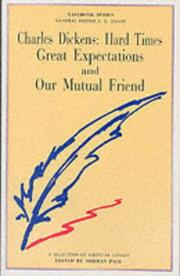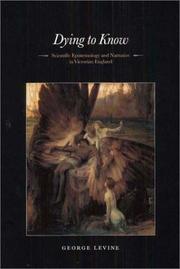| Listing 1 - 4 of 4 |
Sort by
|
Article
Abstract | Keywords | Export | Availability | Bookmark
 Loading...
Loading...Choose an application
- Reference Manager
- EndNote
- RefWorks (Direct export to RefWorks)

ISBN: 0333240375 0333240367 9780333240366 9780333240373 Year: 1982 Publisher: London: MacMillan,
Abstract | Keywords | Export | Availability | Bookmark
 Loading...
Loading...Choose an application
- Reference Manager
- EndNote
- RefWorks (Direct export to RefWorks)
Dickens, Charles, --- Dickens, Charles --- Boz --- Dickens, Charles John Huffam --- Criticism and interpretation. --- Criticism and interpretation --- Dikensi, Čʻarlz, --- Dickens, Karol, --- Dikens, Charlz, --- Ti-keng-ssu, --- Digengsi, --- Dikkens, Charlz, --- Dikensas, Čarlzas, --- Ṭikkan̲s, Cārls, --- Ṭikkan̲cu, Cārlacu, --- Ṭikkan̲s, Cārlas, --- Диккенс, Чарлз, --- דיקינס, צ׳רלס, --- דיקנס, ַ צ׳רלז --- דיקנס, טשרלס --- דיקנס, צ׳רלז, --- דיקנס, צ׳רלס --- דיקנס, צ׳רלס, --- דיקענס, טש --- דיקענס, טשארלז --- דיקענס, טשארלז, --- דיקענס, טש., --- דיקקענס, טשארלז --- טשרלס, דיקנס --- チャールズ.ディケンズ, --- 狄更斯查尔斯, --- Boz, --- Sparks, Timothy, --- Dickens, Charles, - 1812-1870 - Criticism and interpretation --- Dickens, Charles, - 1812-1870 - Hard times --- Dickens, Charles, - 1812-1870 - Great expectations --- Dickens, Charles, - 1812-1870 - Our mutual friend --- Dickens, Charles, - 1812-1870

ISBN: 1282904604 9786612904608 0226475387 9780226475387 0226475360 9780226475363 0226475379 Year: 2002 Publisher: Chicago : University of Chicago Press,
Abstract | Keywords | Export | Availability | Bookmark
 Loading...
Loading...Choose an application
- Reference Manager
- EndNote
- RefWorks (Direct export to RefWorks)
"Dying to Know is the work of a distinguished scholar, at the peak of his powers, who is intimately familiar with his materials, and whose knowledge of Victorian fiction and scientific thought is remarkable. This elegant and evocative look at the move toward objectivity first pioneered by Descartes sheds new light on some old and still perplexing problems in modern science." Bernard Lightman, York University, Canada In Dying to Know, eminent critic George Levine makes a landmark contribution to the history and theory of scientific knowledge. This long-awaited book explores the paradoxes of our modern ideal of objectivity, in particular its emphasis on the impersonality and disinterestedness of truth. How, asks Levine, did this idea of selfless knowledge come to be established and moralized in the nineteenth century? Levine shows that for nineteenth-century scientists, novelists, poets, and philosophers, access to the truth depended on conditions of such profound self-abnegation that pursuit of it might be taken as tantamount to the pursuit of death. The Victorians, he argues, were dying to know in the sense that they could imagine achieving pure knowledge only in a condition where the body ceases to make its claims: to achieve enlightenment, virtue, and salvation, one must die. Dying to Know is ultimately a study of this moral ideal of epistemology. But it is also something much more: a spirited defense of the difficult pursuit of objectivity, the ethical significance of sacrifice, and the importance of finding a shareable form of knowledge.
English prose literature --- Literature and science --- Narration (Rhetoric) --- Knowledge, Theory of, in literature. --- Science in literature. --- Science --- Normal science --- Philosophy of science --- History and criticism. --- History --- Philosophy. --- Descartes, René, --- Descartes, Renatus --- Cartesius, Renatus --- Influence. --- Knowledge, Theory of, in literature --- Science in literature --- 820 "18" --- 820 "18" Engelse literatuur--19e eeuw. Periode 1800-1899 --- Engelse literatuur--19e eeuw. Periode 1800-1899 --- History and criticism --- Philosophy --- Descartes, René --- Rhetoric --- Discourse analysis, Narrative --- Narratees (Rhetoric) --- science, knowledge, research, experimentation, victorian, history, philosophy, objectivity, truth, disinterest, bias, perspective, positionality, self-abnegation, purity, enlightenment, death, sacrifice, descartes, rhetoric, carlyle, autobiography, epistemology, francis galton, machine, ar wallace, women, gender, our mutual friend, dickens, eliot, literature, daniel deronda, hardy, karl pearson, pater, art, altruism, nonfiction.
Book
ISBN: 0691064288 0691100909 1322006598 069161606X 1400857929 9781400857920 9780691064284 9780691616063 0691643407 9780691643403 Year: 1980 Publisher: Princeton, New Jersey : Princeton University Press,
Abstract | Keywords | Export | Availability | Bookmark
 Loading...
Loading...Choose an application
- Reference Manager
- EndNote
- RefWorks (Direct export to RefWorks)
Comedy cannot be understood as an abstract critical concept, argues Roger Henkle; it 'must be studied in specific cultural and historical contexts. From this point of view he examines the development of literary comedy in nineteenth-century England, and shows how comic modes and techniques were used to express and release the tensions of the middle class during periods of both rapid cultural change and relative stability.Originally published in 1980.The Princeton Legacy Library uses the latest print-on-demand technology to again make available previously out-of-print books from the distinguished backlist of Princeton University Press. These editions preserve the original texts of these important books while presenting them in durable paperback and hardcover editions. The goal of the Princeton Legacy Library is to vastly increase access to the rich scholarly heritage found in the thousands of books published by Princeton University Press since its founding in 1905.
English literature --- Thematology --- anno 1800-1899 --- Comic, The --- Middle class --- Literature and society --- Littérature anglaise --- Comique --- Classes moyennes --- Littérature et société --- History and criticism --- Histoire et critique --- Comic, The. --- History and criticism. --- Littérature anglaise --- Littérature et société --- Literature --- Literature and sociology --- Society and literature --- Sociology and literature --- Bourgeoisie --- Commons (Social order) --- Middle classes --- Ludicrous, The --- Ridiculous, The --- Social aspects --- Social conditions --- Sociolinguistics --- Social classes --- Comedy --- Wit and humor --- Aestheticism. --- Aldous Huxley. --- Ambivalence. --- Aphorism. --- Art for art's sake. --- Bab Ballads. --- Becky Sharp (character). --- British humour. --- Comic book. --- Comic novel. --- Criticism. --- Culture and Anarchy. --- De Profundis (letter). --- Disenchantment. --- Dramatic monologue. --- Epigram. --- Falsity. --- Farce. --- Fashionable novel. --- Fiction. --- George Gissing. --- George Meredith. --- Gradgrind. --- Green World. --- Hamlet's Father. --- Harold Pinter. --- Henri Bergson. --- High culture. --- Huckleberry Finn. --- Human behavior. --- Humiliation. --- Humour. --- Hypocrisy. --- Irony. --- Joke. --- Joseph Andrews. --- Kingsley Amis. --- Laurence Sterne. --- Lewis Carroll. --- Libido. --- Literature. --- Little Dorrit. --- Lord Alfred Douglas. --- Lord Byron. --- Madame Bovary. --- Mario Praz. --- Martin Chuzzlewit. --- Max Beerbohm. --- Melodrama. --- Mortal Fear (novel). --- Mr. Dick. --- Narrative. --- Newgate novel. --- Nonsense verse. --- Novel. --- Novelist. --- Oscar Wilde. --- Our Mutual Friend. --- Overreaction. --- Parody. --- Persona. --- Philistinism. --- Picaresque novel. --- Poetry. --- Prose. --- Pun. --- Quibble (plot device). --- Quilp. --- Ridicule. --- Robert Plumer Ward. --- Romanticism. --- Samuel Butler (novelist). --- Satire. --- Self-love. --- Sensibility. --- Sentimental novel. --- Sentimentality. --- Simile. --- Snob. --- Social criticism. --- Superiority (short story). --- The Decay of Lying. --- The Green Carnation. --- The Importance of Being Earnest. --- The Narrator. --- The Newgate Calendar. --- The Old Curiosity Shop. --- The Ordeal of Richard Feverel. --- The Other Hand. --- The Picture of Dorian Gray. --- The Way of All Flesh. --- Thomas Love Peacock. --- Uriah Heep. --- V. --- Victorian era. --- Victorian literature. --- Weedon Grossmith. --- Writer. --- Writing. --- À rebours.
| Listing 1 - 4 of 4 |
Sort by
|

 Search
Search Feedback
Feedback About UniCat
About UniCat  Help
Help News
News